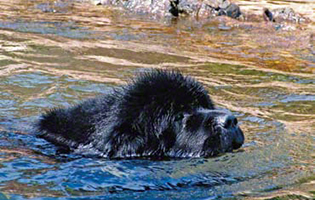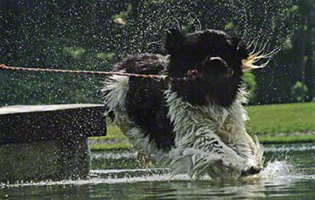by Jenny Zablotny, DVM
“How big is he going to get?”
Many times owners of large and giant breed puppies hope for the largest specimen of their breed. They feed large quantities of food in an effort to achieve this goal. In addition to breaking the feed budget, many puppies will get bigger, around. Fat is not fit and bigger is not better. If your veterinarian says, “We’d like to see less of Fluffy,” there is a problem. Genetics aside, a study by Purina showed that one of the biggest risk factors for developmental orthopedic disease (hip dysplasia, elbow dysplasia, osteochondritis…) is excess weight and that keeping a dog at an appropriate weight can extend their life an average of two years.
For the average Newfoundland puppy, ten pounds of weight per month of age is an average size and appropriate weight gain. There can be some differences as males are usually larger than females and the amount of bone and height can vary considerably between lines. Puppies that are a good weight have ribs and a bit of backbone that are easily felt, a nice waistline through the puppy fuzz and a tuck up underneath just behind the ribs. If you have to dig to feel ribs or backbone, there is too much puppy. Keeping a puppy at an appropriate weight will not affect their ultimate adult size. They will get as big as they are going to get whether they are kept fat or thin.
The amount to feed can be tricky. There are tea cup poodle puppies and Newfoundland puppies and they require vastly different amounts of food. There are large breed puppy formulas, regular puppy formulas, some even feed adult food. For Newfoundlands, a large breed puppy food or adult food is appropriate. Usually the bag will give a range of how much to feed based on your puppy’s age and size. Aim for the low end of the range and feel for ribs. Obviously, as the puppy grows, there will be an adjustment in amount fed. For feeding an average adult dog, a good guideline is one, 8 ounce cup per day for every twenty-five pounds of adult weight. Again, it will vary with exercise and type of food being fed. Newfoundland puppies are commonly fed three times a day (1/3 of their daily amount per meal) until they are four-six months old. If the puppy is eating a good quality diet, supplements are not necessary and can actually cause more joint or bone issues than are avoided.
Exercise is also important. A routine of regular, moderate exercise will benefit your puppy and you! Tired puppies have happy owners. Caution must be taken with amount and type of exercise as intense or lengthy exercise sessions can also contribute to orthopedic issues. A rough estimate for amount of forced exercise (leash walking) is a minute per week of age per day. A 12 week old puppy should get roughly 10-15 minutes of this type of exercise per day. Exercise that is controlled by the puppy, such as playing in the yard, can go on for longer periods.
Developmental orthopedic disease of large and giant breed puppies, while having a genetic basis, can be moderated to a certain extent by feeding for appropriate body condition and regular, moderate exercise. Newfoundland puppy owners can help keep their puppy healthy by keeping them thin and exercised.

